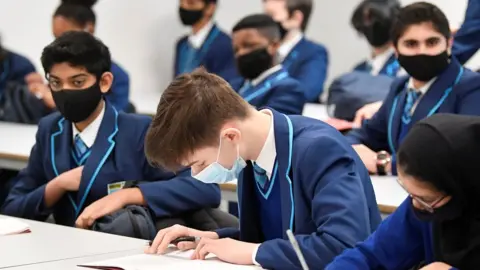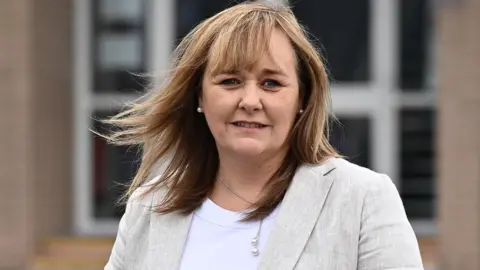Covid-19: Schools can continue to teach some in class bubbles
 Reuters
ReutersSchools in Northern Ireland can continue to teach some children in class bubbles when the new term begins.
That is despite the executive deciding on 12 August that schools no longer had to teach children in bubbles.
But new Department of Education (DE) guidance said schools could "retain the use or partial use of bubbles".
In a separate letter to school heads, the education minister said the guidance allowed schools "flexibility".
Michelle McIlveen also said that the requirement for post-primary pupils to wear facemasks in class would be reviewed by the executive on 8 October.
"What we've tried to achieve here is a flexible system to allow school leaders who know their school environment better than us to adapt accordingly," she told BBC's Good Morning Ulster programme.
"We have been clear. This is about keeping our young people safe."
The revised guidance from the department comes just days before many staff and pupils are due to return to school.
As much as possible, children remained in the same class groups every day to reduce mixing with others.
The new guidance said it would be "for each school to determine if they wish to continue to use some/all of the principles of bubbles that they will have used during the 2020-21 year".
"Without the use of formal bubbles, schools should still seek to reduce contacts," the guidance said, as this would "support the PHA's (Public Health Agency's) contact tracing by encouraging pupils to remain within a consistent group of pupils wherever possible".
Schools have also been told to space seating in classes as widely as possible and have children seated facing the front of the classroom.
They have also been asked to hold activities outdoors if they can.
 Pacemaker
PacemakerGraham Gault, of the National Association of Headteachers, said there was an "air of disbelief" among school leaders at the guidance.
"Only a week ago it was all over the media that bubbles would no longer be required," he said, adding that the guidance "has the potential to confuse".
Speaking to the BBC's Good Morning Ulster Programme, Mr Gault said the guidance would not require any significant changes to Covid-19 mitigation measures already in place in schools.
"The advice that we are giving to school leaders across the country is the routines and mitigations that you have already set up, that your school community is already familiar with, that your teachers are already implementing are still appropriate. If it's working for you, don't change it."
Chris Logan, principal of Comber Primary School, said the changes have come too late for schools to make "sweeping changes" before term begins next week.
"Schools need time to prepare the curriculum and we may see time before schools are enable to enact some of the changes. It just takes time to plan and prepare," he told BBC News NI.
New self-isolation arrangements
The executive had also decided that if a child was identified as a close contact of a positive Covid case, they would no longer have to self-isolate for 10 days.
Instead, they should self-isolate and book a PCR test.
If the PCR test is positive they should isolate for 10 days, but if the result is negative they can end their self-isolation.
However, the new department guidance does not provide detailed advice for schools on the new arrangements.
Instead, Ms McIlveen said that the PHA was currently "preparing guidance" for schools on the new self-isolation arrangements.
She said that was to ensure they "applied equally to all pupils in each year group".
However, she did not state when schools would receive the new PHA guidance.
All indoor and outdoor extra-curricular activities can also resume in schools when the new term begins.
According to the department guidance, that includes "music or singing".
However, children can sing in class and school choirs can now sing again indoors though mitigations should be in place like doors or windows being kept open.
Ms McIlveen thanked school leaders and staff for their support and wished all pupils, teachers and staff a "safe return to all our educational settings".
The guidance was developed with the Department of Health and in consultation with school leaders and trade unions.
